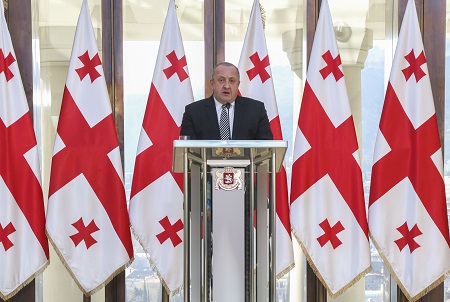President of Georgia vetoes judicial reforms bill

Georgian President Giorgi Margvelashvili vetoed a package of bills today known as the "third wave of judicial reforms”, which were presented to him after the Georgian Parliament approved the bill on December 29, 2016.
Margvelashvili announced his veto at a special press briefing held at the Avlabari Presidential palace in Tbilisi this afternoon.
The President praised a portion of the legislative changes as "very useful and important”, but criticised other proposals "opposed to the principles of justice and equality” and offered six recommendations to the Parliament to improve legislation.
"A legislative package on the judiciary was sent from Parliament to me to sign […]. In the package there are many useful and important amendments, which we wanted implemented and thousands of lari have been spent by our administration for their implementation [...] However, simultaneously, the package also contains notions which resist the principles of an unbiased court and go against the independence of individual judges”, Margvelashvili said.
The President said that since the topic is very important, he decided to veto the package and offer the Parliament the following recommendations:
- Judges of each court should be given the opportunity to elect their own chairperson in order to increase the court’s independence. In contrast, in the package adopted by Parliament, court chairpersons were to be elected by the High Court of Justice.
- A person should not able to be a court chairperson and chamber and/or board chairperson at the same time.
- A judge should not have to go through a three-year probation period before being appointed to his or her position.
- The number of judges of the Supreme Court should be defined by law.
- Judges should have the opportunity to be represented more accordingly in the High Council of Justice since court chairpersons will no longer be able to be a member of the Council.
- Rules of acquiring and spreading information on each candidate in the process of selection for being a judge should be provided for.
The President said he hopes the Parliament will consider his recommendations to perfect the country’s judiciary system.
Which part of the amendments did the President approve?
Margvelashvili praised aspects of the bill according to which an electronic case assignment system will be introduced starting in 2018. Within this system, cases will be assigned automatically to regional, appeals and Supreme Court judges, through random electronic selection. Cases can also be assigned by alphabetical order of judges if there are delays in the electronic system.
What’s next?
Parliament must discuss the President’s recommendations in the next 15 days. If lawmakers approve all of the President’s recommendations, the package will be sent to the President in the following five days after which the President will have one week to sign and publish the law.
If Parliament does not fully approve the recommendations, the initial draft of the amendments will be voted on. At least three-fifth of all Parliament Members is needed for the presidential veto to be overridden.
 Tweet
Tweet  Share
Share